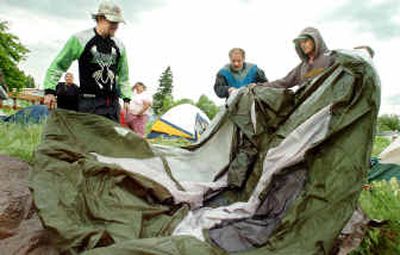Police plan to evict tent city

A handful of homeless people, who set up camp on public property in Spokane’s East Central neighborhood, could be “evicted” from their temporary homes today.
Spokane police told Dave Bilsland, and about 13 others who pitched tents on city land across from the East Central office of the Spokane Neighborhood Action Program building on East Stone, that they have until this afternoon to leave.
Bilsland, most noted for organizing last summer’s protest against the city’s transient shelter ordinance, pitched tents Sunday on property near College and Cedar streets, near the Spokane County courthouse. Diamond Parking Services, which owns the property, told them to leave, Bilsland said.
Bilsland said the reason behind his latest protest was to recognize International Tent City and Alternative Housing Day.
Police, however, evoked the city ordinance that was passed last summer that prohibits camping on public property.
Last July, police removed about 50 protesters who pitched tents on a grassy strip at Monroe Street and Riverside Avenue.
The 10-day protest, organized by Bilsland and his People 4 People group, ended peacefully.
Bilsland said 11 police officers in nine cars arrived at the vacant lot Monday afternoon and told those camping – some homeless and others just supporting the cause – they must leave within 24 hours.
Dick Cottam, police spokesman, confirmed police were on the scene but could not verify the number of officers.
If the campers do not cooperate and leave today, violators can be fined up to $1,000, receive a maximum 90 days in jail, or both.
“If they are dumb enough to arrest us with the way the jail is (crowded), hey, they’re the ones who will have to do all the paperwork,” said Sharlene Jay, a homeless woman on a waiting list for housing.
Will Walker, who owns a house north of Monday’s campout, showed his support by bringing campers coffee, baked potatoes and cornbread.
“It’s Southern hospitality,” said Walker, who described himself as an activist from the ‘60s.
“When you’ve got new neighbors you bring them something. That’s just manners.”